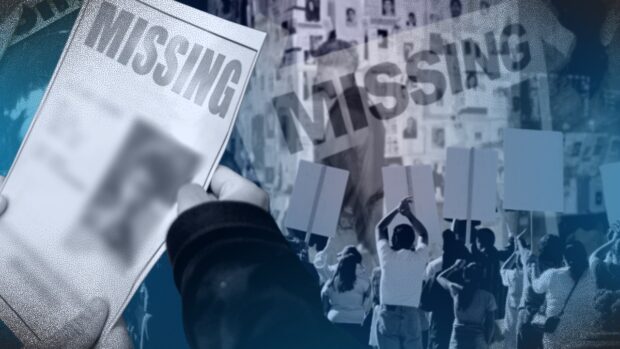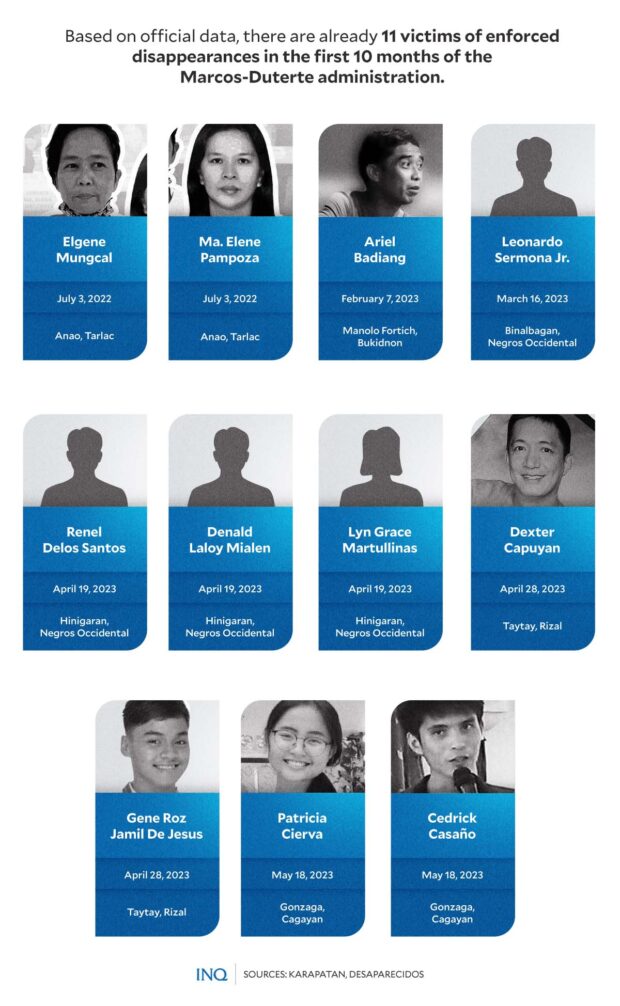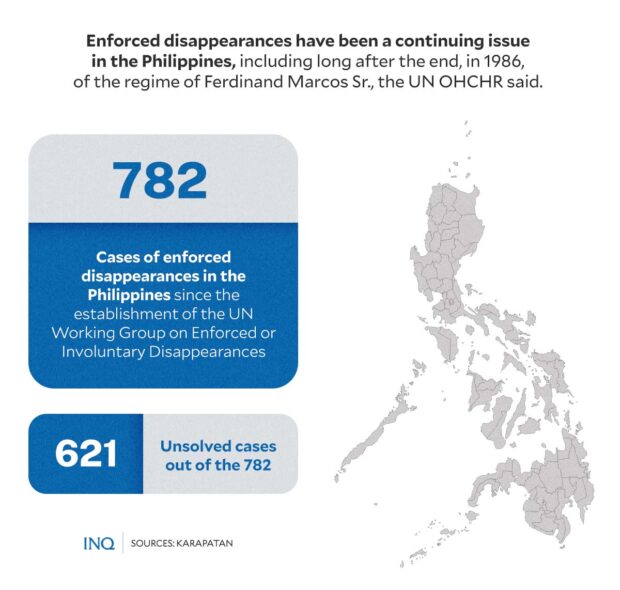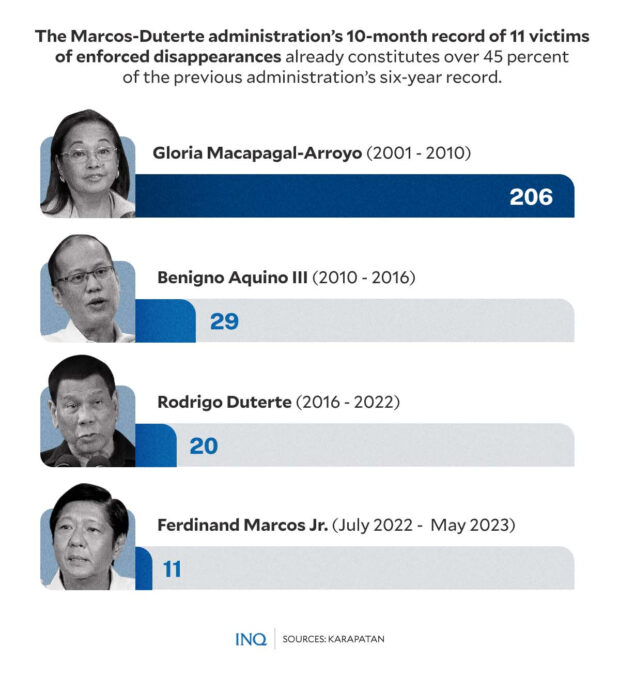Enforced disappearances of activists show assault on freedoms continues

PHOTO: JEROME CRISTOBAL/INQ STOCK PHOTO
MANILA, Philippines—Mercedita de Jesus was once an activist herself and saw how tough it was for people, especially the youth, to pursue activism. It was the reason she was hesitant when her son became an activist, too.
Her son, Gene Roz Jamil “Bazoo” de Jesus, is “very lovable.” She said he was an early reader, loves books and journals, and draws human figures so adeptly that he could copy images in a magazine.
As a son, Bazoo, according to Mercedita, is “so connected to us even if we are far away from him in distance since me and my husband are overseas workers in Italy.” She said “we always encourage him to write to us and continue writing poems.”
She said even Bazoo’s cousins “look up to him as an advisor,” saying that “whatever problems they are having, he listens and never becomes judgmental with their actions.”
“As a brother to his ate (elder sister), he is very supportive and understanding. He looks up to her as his second parent,” she told INQUIRER.net via FB Messenger on Monday (May 29).
But when Bazoo went missing on April 28, Mercedita said she could do nothing but look back at her own activism and hope that the people behind his enforced disappearance will bring him back.
RELATED STORY: Remembering desaparecidos: The unending anxiety of uncertainty
A parent’s anxiety
Mercedita was once an activist herself in the 1980s, or when Ferdinand Marcos Sr. was still president, and saw how the rights of activists, like her, have been violated by state forces.
She said she relayed this to Bazoo when “he asked us about our past experiences when we were still in college.” She said he was reluctant at first to take part in any organizations at the University of the Philippines (UP)-Baguio.
But he eventually became an activist when he was already a third year college student. “At first, I was not in favor because I wanted him to concentrate on his studies,” Mercedita said.
But Bazoo “told us that he could manage everything and he really did because he graduated from his journalism course as cum laude even if he was already a student leader then.”
Then after his graduation, Bazoo became a full-time activist and chaired a youth-based organization and continued organizing students, young people and communities in the Cordillera Administrative Region.
But while his advocacy was focused on the rights of indigenous peoples and students, Mercedita said “his involvements brought some fear to us, especially with the thought that the Duterte administration [then] was into its drive to stop activism.”
‘It happened’
A month ago, Mercedita’s worst fear came true as Bazoo, and his companion, Dexter Capuyan, went missing late in the evening of April 28 in Taytay, Rizal, according to a statement from the Cordillera Human Rights Alliance.
READ: Rights advocates worry about safety of missing activists
“His involuntary disappearance brought back past memories of the 1980s,” she said.
Bazoo, 27, was working as an information and networking officer for the Philippine Task Force for Indigenous People’s Rights, while Capuyan was an activist-leader based in La Trinidad, Benguet when they went missing.

GRAPHIC Ed Lustan
Initial information said the two were taken by men who introduced themselves as operatives of the Criminal Investigation and Detection Group (CIDG). But the CIDG already denied any involvement.
According to the human rights group Karapatan, blotter or incident reports have already been filed at concerned barangay and police offices in Taytay, Taytay Police Station, and Philippine National Police (PNP) Provincial Office in Rizal.
Kaparaptan said the victims’ families have already gone to several police stations and military camps to check if Bazoo and Capuyan are being kept there, but the two are still nowhere to be found.
Missing activists
According to official data from Karapatan, the two are the eight and ninth persons involuntarily disappeared since July last year, when Ferdinand Marcos Jr. started his presidency.
RELATED STORY: UP Manila, rights groups demand surfacing of two activists
However, last May 18, two more activists were added to the list, when community organizers Patricia Cierva, a graduate of UP Manila, and Cedrick Casaño, a graduate of the Polytechnic University of the Philippines, went missing.
Karapatan Cagayan Valley alleged in a May 25 statement that military men took the two alive in Gonzaga, Cagayan. The military has been launching offensives against the New People’s Army in the province since February.
According to Karapatan, in a mere 10-month period, there have already been 11 victims of enforced disappearances, already constituting over 50 percent of the Duterte administration’s six-year record of 20 persons involuntarily disappeared.
Five of the 11 victims went missing in April 2023 alone—Bazoo and Capuyan, and Renel Delos Santos, Denald Laloy Mialen and Lyn Grace Martullinas, who were last seen in Hinigaran, Negros Occidental on April 19, 2023.
The group has documented 206 missing when Gloria Macapagal-Arroyo was president for nine years. Almost 30 individuals went missing, too, from 2010 to 2016, or when Benigno Aquino III was president.
The rest are Elgene Mungcal and Ma. Elene Pampoza (last seen in Anao, Tarlac on July 3, 2022); Ariel Badiang (last seen in Manolo Fortich, Bukidnon on February 7); and Leonardo Sermona Jr. (last seen in Binalbagan, Negros Occidental on March 16).
Mungcal and Pampoza are both Gabriela activists, while Badiang is a National Democratic Front of the Philippines consultant. Sermona Jr. is a peasant organizer in Negros Occidental.
According to Karapatan, in a statement to commemorate the International Week of the Disappeared, “the rapid increase in such incidents bodes ill for the already deteriorating human rights situation in the country.”
Prevalent in PH
The United Nations (UN) Office of the High Commissioner for Human Rights had said “politically-motivated enforced disappearances have been a continuing issue in the Philippines, including long after the end, in 1986, of the Marcos Sr.’s regime.
RELATED STORY: What went before: 1,838 desaparecidos since Marcos
Since its establishment in 1980, the UN Working Group on Enforced or Involuntary Disappearances transmitted 782 cases to the Philippines and of these, 621 remain unsolved.

GRAPHIC Ed Lustan
Karapatan said “enforced disappearances, by their very nature, constitute crimes against humanity.”
“They are tools of political repression and mass terror, inflicting immeasurable pain and suffering on families, who are left in a perpetual state of anguish and uncertainty, desperately seeking answers and the return of their loved ones,” the group said.
It said those behind the disappearances “violate the most fundamental human rights and are an affront to the principles of justice and dignity.” The perpetrators, it said, are convinced that society in general would forget the victims.
READ: 3 UP campuses join clamor to surface missing activists
“But for as long as human rights defenders here and abroad stand in solidarity with the victims and their families, they will not be forgotten, and the struggle to put an end to enforced disappearances, ensure justice for the victims, and hold the perpetrators accountable will continue,” Karapatan said.
Ineffective law?
Back in 2012, the Philippines enacted Republic Act No. 10353, or the Anti-Enforced or Involuntary Disappearance Act of 2012.
The UN said then that “firm and clear political will is an essential element in the fight against enforced disappearance.”
“This Act demonstrates the political will of the Philippines and its people to prevent and eradicate the terrible practice of enforced disappearances,” the UN said.
However, 10 years since the law took effect, Karapatan said the Philippines still has one of the highest number of cases of enforced disappearances.
Karapatan has been calling on the Commission on Human Rights to conduct an urgent investigation on the enforced disappearances.
It said “we are racing against time,” stressing that it was hoping to locate the victims safe and alive, and reconciled with their worried families.
READ: Clamor to surface 2 missing Cordillera activists grows
“If state authorities cannot justify the continuing detention of these two activists, they must be released immediately and their captors held liable under the Anti-Desaparecido law,” it said.
Under the Anti-Enforced or Involuntary Disappearance Act, the crime of involuntary disappearance is punishable by life imprisonment.















